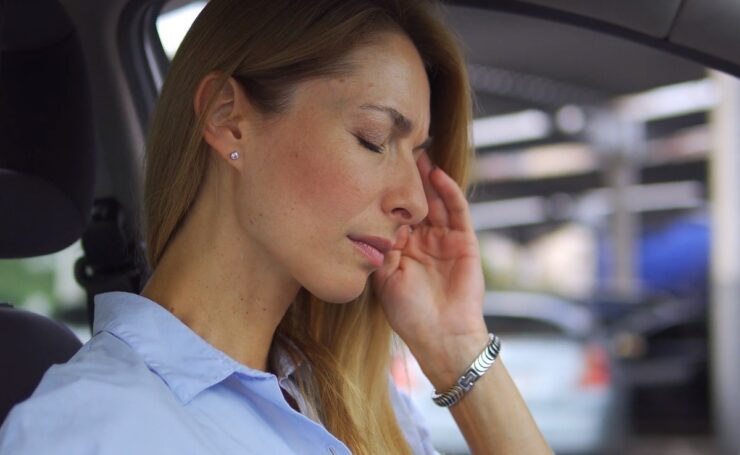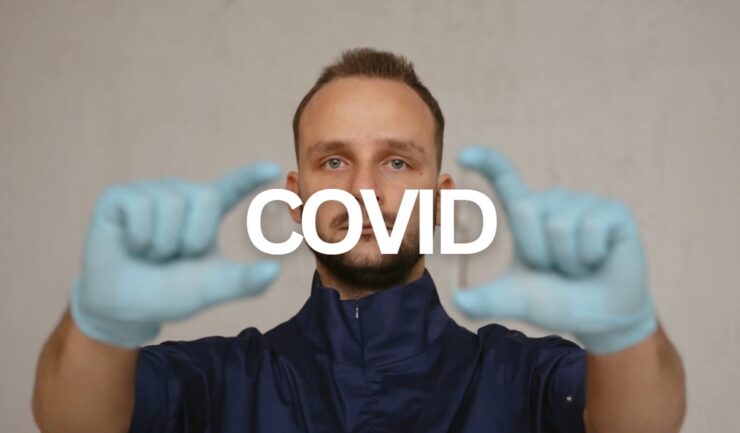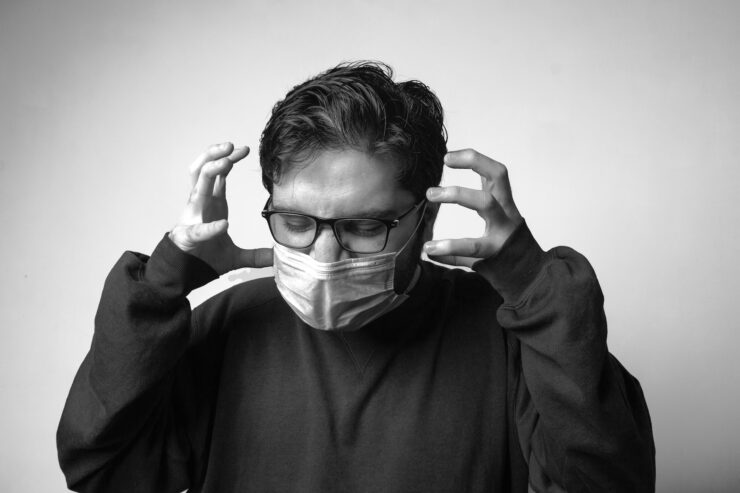COVID-19 is a respiratory illness caused by the SARS-CoV-2 virus that has affected millions of people worldwide. While the common symptoms of COVID-19 include fever, cough, and shortness of breath, dizziness has also been reported by many individuals who have contracted the virus. Dizziness can be a very uncomfortable and unsettling symptom, and those who experience it may wonder how long it will last. In this article, we will explore the topic of how long COVID dizziness lasts and provide information on how to manage this symptom.
How Does COVID-19 Cause Dizziness?

It affects your respiratory system and can reduce your blood oxygen levels. It does this by infecting your lungs, causing inflammation and damage. This leads to breathing difficulties and a drop in oxygen, making you feel lightheaded or dizzy. It can also change your blood pressure and heart rate, resulting in more dizziness. The length of time for lightheadedness can be from a few days to a few weeks.
If your symptoms are persistent or severe, see a doctor.
Other Symptoms
Cough, fever, and fatigue are common symptoms. But, dizziness, vertigo, and balance disorders can also indicate infection. The cause of COVID-induced dizziness is unknown. It might be connected to the virus’s effect on the central nervous system.
If you have lightheadedness, plus other symptoms, call a doctor right away. Or if you have prolonged lightheadedness after recovering from it, talk to your doctor about possible long-term effects and treatment.
If you have any worrying symptoms during or after a COVID-19 infection, seek medical attention urgently.
Duration of Lightheadedness

Lightheadedness is a symptom of COVID-19 that many people experience. It’s uncomfortable and disorienting but usually doesn’t need medical treatment. It will resolve on its own.
But how long does this dizziness last? We’ll answer this in this article.
Common Duration
It is a frequent symptom of COVID-19. Its time frame varies from one person to the next. Some may have it for a few hours or days, while others could have it for weeks, and in rare cases, even months.
Factors affecting severity and duration include age, overall health, pre-existing medical conditions, immune system response, and COVID-19 infection severity.
If you are experiencing lightheadedness, it is important to get medical help right away, especially when accompanied by other symptoms such as fever, cough, and shortness of breath.
Timely diagnosis and treatment can help shorten and reduce the intensity due to COVID-19.
Factors that Affect Duration
Factors that affect its time include:
- The severity of infection – worse infection, longer lightheadedness.
- Presence of other symptoms – if you have fatigue or nausea, lightheadedness can last longer.
- Age – older adults can have lightheadedness for longer.
- Pre-existing medical conditions – high blood pressure or heart disease means lightheadedness lasts longer.
- Overall health – healthier people have shorter dizziness duration.
Consult a medical professional if you experience dizziness from COVID-19. To help, stay hydrated and get enough rest.
When to Seek Medical Attention for COVID-19-Related Dizziness
Medical attention is needed if it persists after recovery or lasts abnormally long. Usually, this lightheadedness lasts a few days to a week. But, it can last longer. If it lasts more than two weeks, it could signal an underlying health issue.
If nausea, severe headache, or any other alarming symptoms such as chest pain, difficulty in breathing, or extreme fatigue occurs, seek medical help right away. Swift diagnosis, treatment, and medical intervention can increase the chances of recovery and reduce health problems.
Treatment of COVID-19 Dizziness

To get back to your normal life, it’s good to know the treatments you can use. Here we look at what can help with it.
Home Remedies
COVID-19 dizziness is a very common symptom. Medical treatments are available, but also some home remedies to help. Here are a few of them:
- Stay hydrated with water, soup, and tea.
- Get lots of rest and don’t overexert yourself.
- Deep breathing exercises, like diaphragmatic breathing, can regulate your breathing and reduce lightheadedness.
- Ginger in tea or oil form can reduce inflammation and lightheadedness.
- Massage acupressure points, such as temples and wrists, for nausea and lightheadedness relief.
It’s important to remember that COVID-19 can cause different symptoms, including dizziness. If you experience dizziness or other COVID-19 symptoms, go to a healthcare provider for proper medical care and advice.
Medications for COVID-19 Lightheadedness
Medications can help relieve lightheadedness. Treatment duration depends on the intensity of dizziness and the underlying issue. Here are some medications for treating COVID-19 dizziness:
- Meclizine blocks signals to the brain.
- Diazepam calms nerves and muscles.
- Steroids like dexamethasone reduce inflammation in the brain.
- Antiviral medication can speed up recovery and reduce lightheadedness.
- Treatment duration depends on severity and condition.
Physical Therapy
One way to help is physical therapy. Common treatments for lightheadedness include:
- VRT – this retrains the brain to cope with any vestibular problems.
- Eye movement exercises – this help improve eye coordination and lessen dizziness.
- Gait training – this helps you walk and balance, reducing the risk of falls.
- The duration of treatment changes from person to person. Some may feel better after a few sessions. Others may take weeks or months to get the best results.
Coping Strategies

It can cause dizziness. This symptom can be hard to manage. It makes it tough to concentrate and get things done. There are strategies to help cope with it.
Let’s look at them more closely. These strategies can help you manage the symptom and feel better.
Adjusting Daily Routine to Accommodate for COVID-19 Dizziness
Coping with it can be tough, but small changes to your routine can help. Here are some tips:
- Give yourself extra time to move around. Avoid sudden, jerky movements.
- Drink lots of fluids, especially if you have other symptoms like fever or sweating.
- Avoid bright lights or loud noises that could trigger dizziness or vertigo.
- Take regular breaks and rest in a quiet, dark room if needed.
- Keep your healthcare provider informed and follow their advice for treatment, medication, or therapy.
It’s typical for them to last for 2-6 weeks, and some patients have reported symptoms lasting up to a few months. Pro tip: Keeping a daily journal of your symptoms, as well as what you ate, drank, and did that day, can help you track triggers and patterns and figure out which coping strategies work best for you.
Seek and Accept Support from Family and Friends
This is a really uncomfortable feeling. To cope, reach out to family and friends for help.
Talk to them about what you’re feeling. Ask for assistance with complex activities, like running errands or cooking. Accept offers of help from your loved ones.
Stay in touch with them and keep them updated. Having a support system can make things easier and speed up your recovery.
Prevention

It can be light or severe and last days or weeks. Luckily, there are ways to help prevent or reduce it. This section covers what to do if you experience COVID-19 dizziness.
Getting the Vaccine
Getting it is an important step to protect yourself and others from the virus. But, some can experience dizziness as a side effect. Here’s what you need to know:
To reduce lightheadedness, stay hydrated and avoid caffeine and alcohol. If the lightheadedness continues or is accompanied by serious symptoms like chest pain or difficulty breathing, seek medical help right away.
In the end, getting the vaccine is the best way to protect yourself and those close to you from the virus and its complications.
Maintaining COVID-19 Precautions to Prevent Transmission
COVID-19 precautions are vital to stop its transmission. The length of the dizziness related to COVID-19 may depend on age, health and infection severity.
Here are a few tips to avoid COVID-19 dizziness:
- Drink plenty of water – Hydrate yourself to keep your blood pressure healthy.
- No Alcohol or Smoking – This can dehydrate and lead to low blood pressure causing dizziness.
- Manage Anxiety – Try meditation, and yoga to ease off the dizziness.
FAQs

Can COVID-related dizziness be a long-term symptom?
Yes, in some cases, it can persist for several weeks or even months after the initial infection.
Can anxiety cause dizziness in COVID-19 patients?
Yes, anxiety can be a contributing factor to it in these patients, as the virus can cause increased stress and anxiety.
Can dizziness be a symptom of the COVID-19 vaccine?
Yes, it has been reported as a possible side effect of the COVID-19 vaccine, although it is typically mild and short-lived.
Is there a specific test to diagnose dizziness in COVID-19 patients?
There is no specific test to diagnose it in these patients, but a healthcare provider may perform a physical exam and order diagnostic tests such as blood work or imaging tests.
Can dizziness in COVID-19 patients lead to fainting?
In some cases, patients can lead to fainting. It’s important to seek medical attention if you experience severe or persistent dizziness.
How can I manage dizziness while recovering from COVID-19?
Managing it while recovering from COVID-19 can include staying hydrated, practicing deep breathing exercises, avoiding sudden movements, and taking any prescribed medications as directed by a healthcare provider.
Conclusion
In conclusion, COVID-19 can cause a range of symptoms, including dizziness, which can last for varying lengths of time depending on the individual. While some people may experience dizziness for only a few days, others may have symptoms that persist for weeks or even months. It’s important to stay in contact with your healthcare provider if you are experiencing dizziness as they may be able to offer guidance on how to manage this symptom.
Additionally, it’s important to follow all recommended guidelines to prevent the spread of COVID-19 and to seek medical attention if you experience severe or persistent symptoms. By staying informed and taking care of your health, you can manage dizziness and other symptoms associated with COVID-19.

